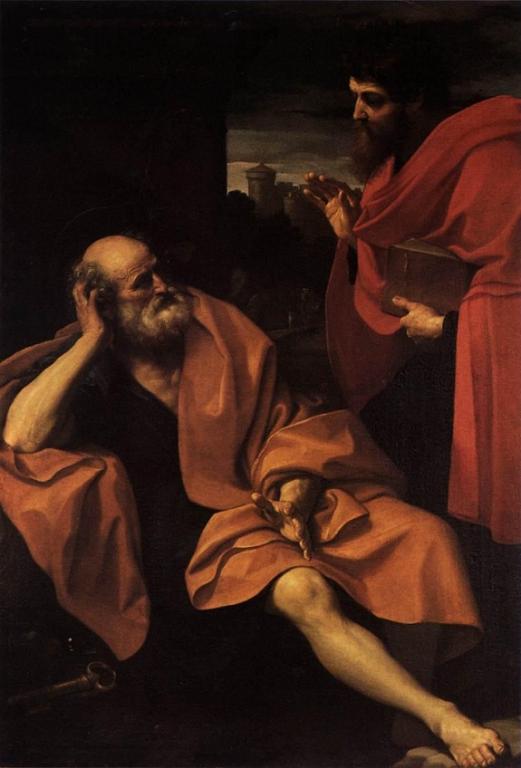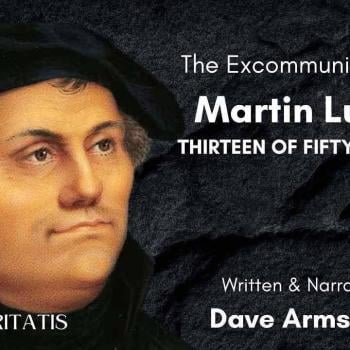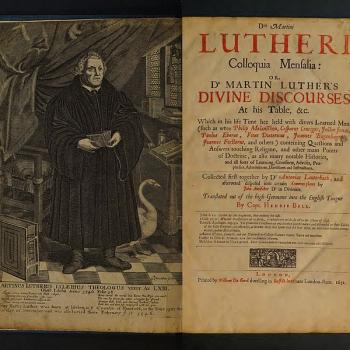Is Conciliar Authority Binding on Protestants (Especially When it is Guided by St. Paul and St. Peter?)
Sts. Peter and Paul, by Guido Reni (1575-1642) [public domain / Wikimedia Commons]
* * *
Jerry Walls is an evangelical philosopher who is writing an upcoming book on Catholicism. He has written or edited a dozen books and over eighty articles. His words (in blue) following, come from his public Facebook post, Roman Apologetic Overreach: An All Saints Day Meditation.
* * * * *
Let me be frank. I find it very annoying when Roman apologists badly overreach in order to advance their claims about the Church of Rome. It is especially annoying when done by former evangelicals who seem bent on discrediting the Churches that first taught them to love Jesus and nurtured them in the faith, in order to legitimize their decision to join a Church that entails breaking communion with their previous Churches.
Here is the sort of thing I have in mind.
[A]nother Roman Catholic claimed that Acts 15 was a problem text for the Protestant doctrine of the authority of Scripture, . . .
. . . the text comments that the apostles and elders, “with the consent of the whole church” decided to send a delegation to represent them. The text appeals to the unanimity of the decision, and to the leadership of the Holy Spirit 9 (vv 25, 28), but never is Peter’s testimony singled out as having settled the matter or as the decisive factor in the decision. (For a thoughtful discussion of Acts 15 in the context of a defense of “sola scriptura” see chapter 3 of Reformed Catholicity by Michael Allen and Scott R. Swain). There is nothing here remotely problematic for Protestant ecclesiology.
Again, the point here is about overreaching claims. Many Roman Catholics acknowledge that the distinctive claims of their church are not clearly supported by scripture or early church history.
Granted, some Catholics can make too-grandiose claims in a triumphant manner. We hardly ever deny that y’all are Christians, unlike how some of you (not including you, Jerry) regard us, but that point is well-taken.
That said; in the spirit of ecumenical disagreement-within-respect, I have a bone to pick with one of your arguments. You stated: “to claim their case is decisive or that Protestants have no viable interpretations of the contested texts is overreaching of the worst sort.” I agree again. Therefore, I’d like to hear how you interpret one passage having to do with the Jerusalem Council.
“There is nothing here remotely problematic for Protestant ecclesiology.”
Okay. How about this passage:
Acts 16:4 (RSV) As they [Paul and Timothy] went on their way through the cities, they delivered to them for observance the decisions which had been reached by the apostles and elders who were at Jerusalem.
When (among Protestants) was the last council held a particular location, with the elders of the entire Church [at that time, Paul and Peter and others], binding for [Protestant] Christians at large in other locations, far away? Don’t Protestants always have the right to say that it was in error, since Scripture alone is their rule of faith?
After all, that’s precisely what Luther said (councils can err, so he went by Scripture and plain reason), so why couldn’t Christians reject the decisions of Acts 15 and defy Paul’s injunction, described in Acts 16:4?
Any Protestants out there wanna educate me as to how Protestants interpret this?
Both Witherington and Keener have commentaries on Acts if you really want to know.
That’s fine. I love commentaries. But I also wondered what you thought, since you made such a point in the post, about the Jerusalem Council not being a problem for Protestant ecclesiology.
You really think it is a problem for Protestant to think a decision that was made by the apostles and was given to the churches had authority? By the same apostles who authored New Testament books?
Okay, so no Protestant was at liberty to dissent from the decisions of that council? Luther’s “councils err” notion doesn’t apply here? If they CANNOT dissent from it, how is that not a violation of sola Scriptura?
John Calvin apparently had a problem with apostolic and conciliar authority. He gets out of the seeming dilemma in his Commentaries by saying (with no NT warrant that I can see) that it was merely a temporary decree:
In these words Luke doth signify unto us how desirous Paul was of peace. The best and strongest bond to keep and foster peace among the churches, was to keep that which was set down by the apostles. When Paul taketh great pains about that, he taketh great heed lest through his fault there arise any trouble. And let us remember that that continued but for a time. Because, so soon as he seeth the danger of offense cease, he doth quite unburthen the churches, and setting apart the decree, he maketh that free which the apostles had their forbidden. And yet doth he not cancel or violate by that abrogation that which the apostles had decreed, or contemn the authors themselves; because they were not determined to establish a perpetual law, but only to mitigate for a short time that which might hurt weak consciences; as I did more at large declare in the former chapter. Whereby the folly of the Papists is sufficiently refuted, who do grievously lay to our charge that we be far unlike Paul, because we will have the consciences of the godly governed by the Word of God alone, setting light by the decrees of the Church, as they call them, and not to be subject to the will of men.
Do you agree with Calvin that what the Holy Spirit through apostles (including Peter and Paul) decreed, was only temporary?
It was a problem for Calvin to think that a decision that was made by the apostles and was given to the churches had permanent authority. That was too ” subject to the will of men” for him.
Like I said, there are numerous outstanding commentaries on Acts by Protestant scholars. If they don’t answer your questions in they way you prefer to support Roman claims, sorry. That does not mean they have a problem with Acts 16:4 and your attempt to say they must is typical overreaching.
I’m not so much trying to support “Roman” claims, as to understand Protestant claims.
I haven’t said anything about them (apart from Calvin). I was asking you because you gave a strong opinion of the Jerusalem Council as perfectly consistent with Protestant ecclesiology.
Calvin was a Protestant scholar and pretty important figure, and he says that the decision was merely temporary. I give him points for self-consistency as well as extraordinary chutzpah. When push comes to shove, Calvin will dissent from Peter and Paul and the Holy Spirit, rather than give up sola Scriptura.
But he’s just one guy. I am assuming that Protestant commentators today have come up with a better solution than that.














